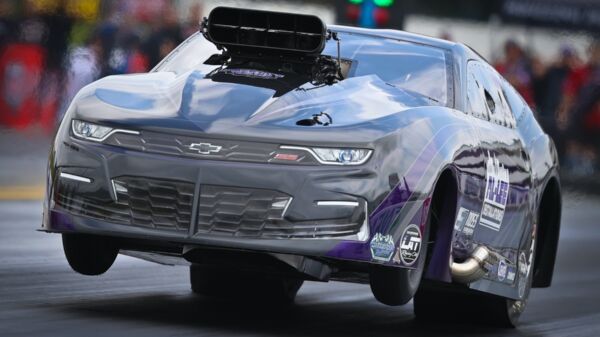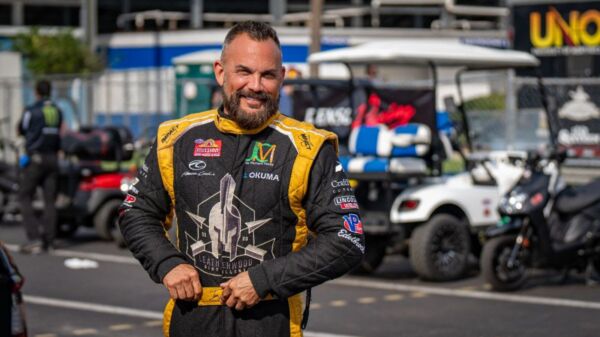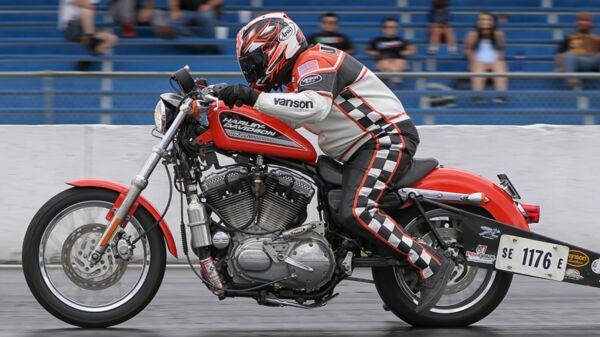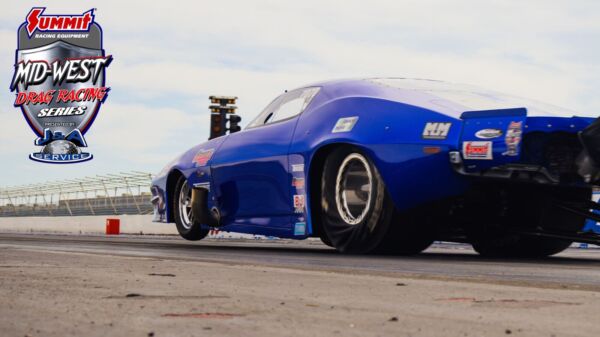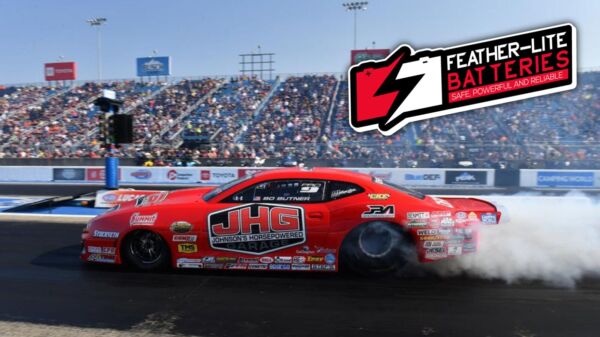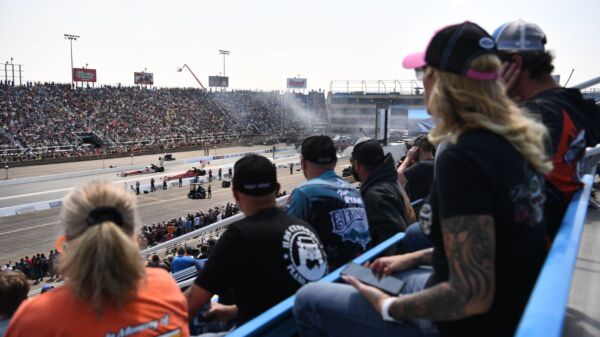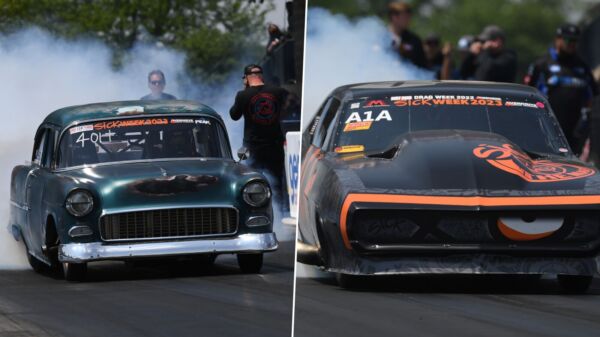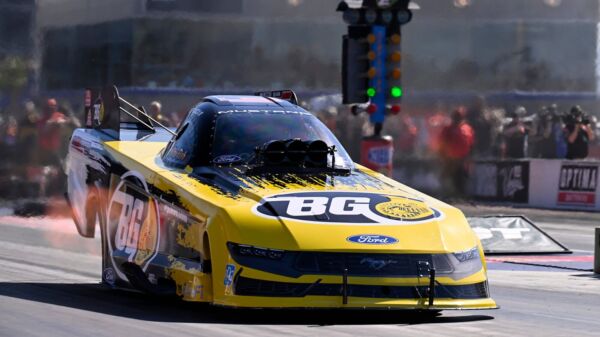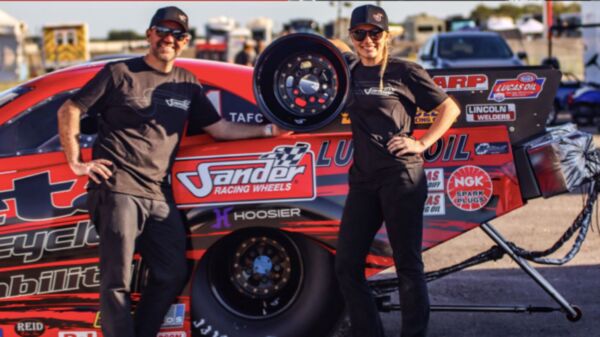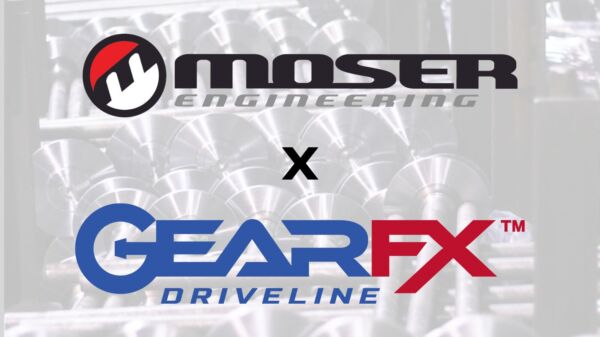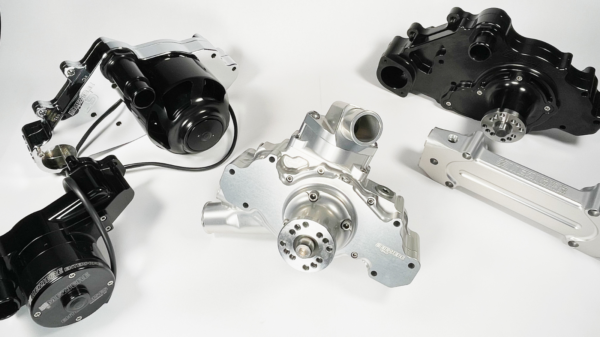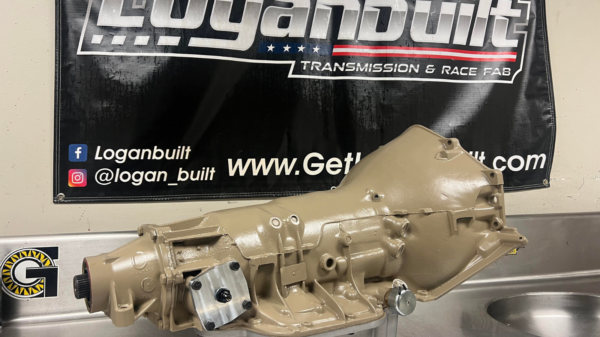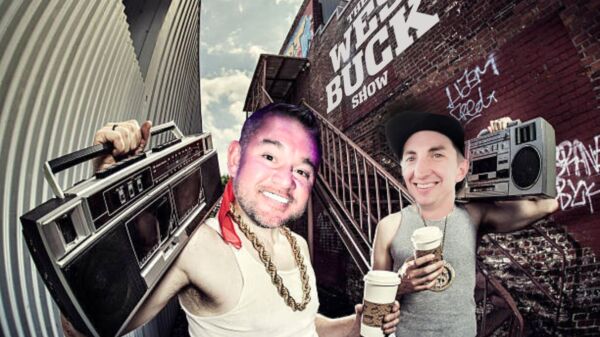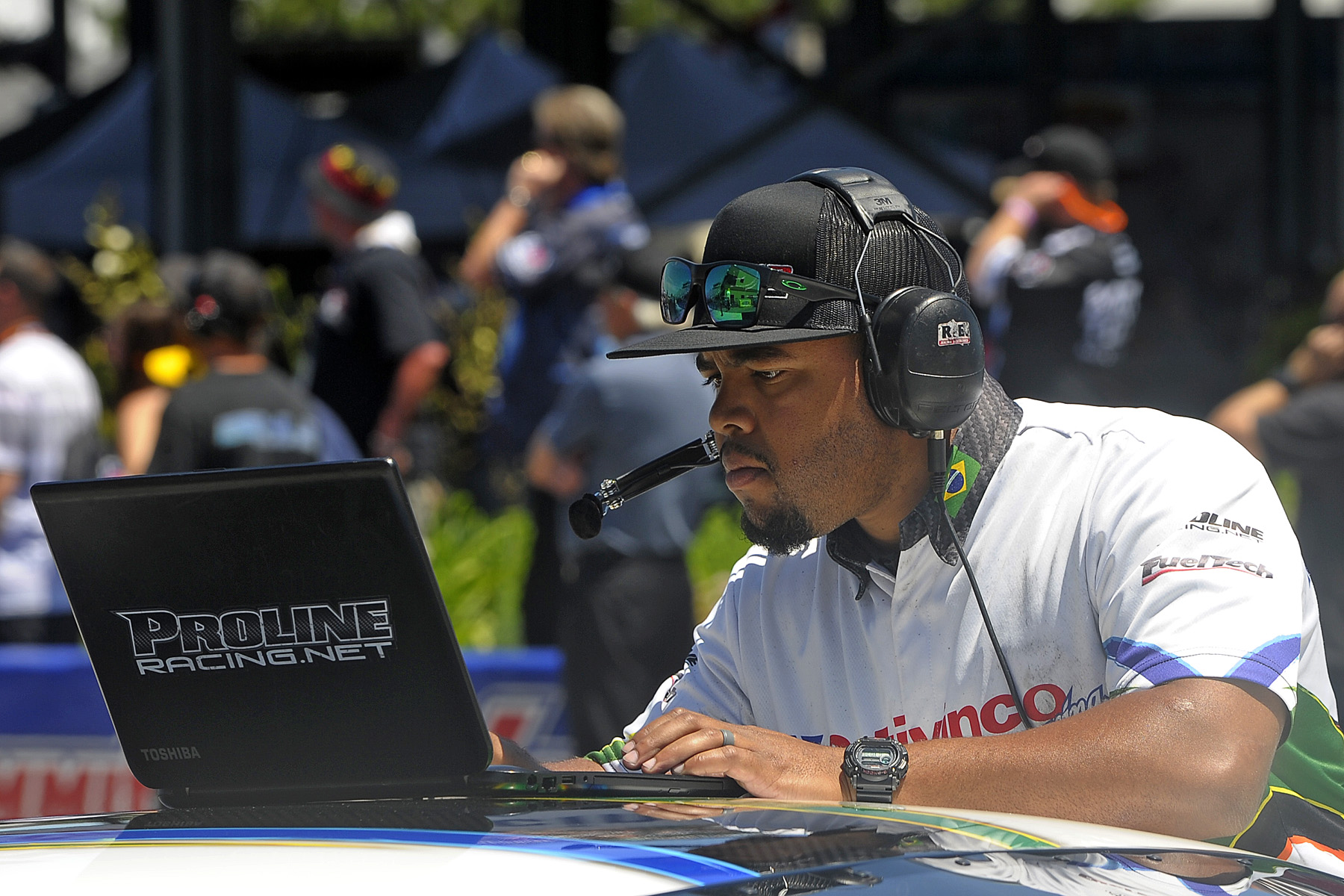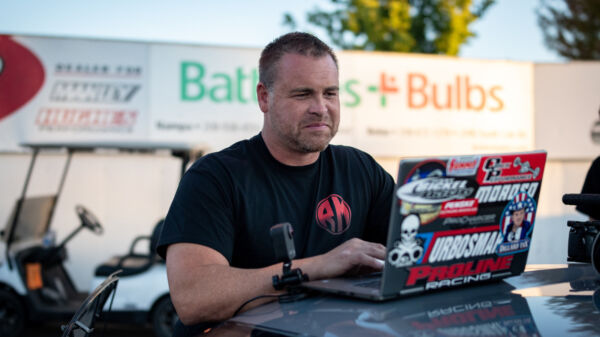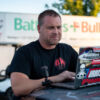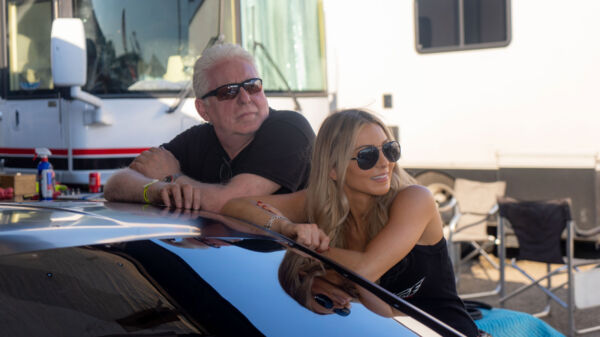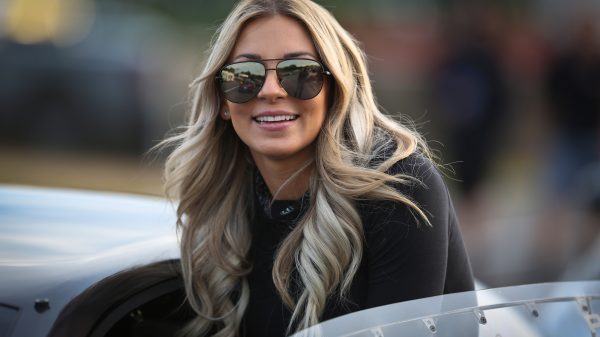Justin Elkes had spent 15 years in Pro Stock, which accounted for thousands upon thousands of runs. He had enjoyed plenty of success at a tuner, but it was all he knew, and by 2010 he wanted to become a more versatile tuner.
Enter Pro Mod and working with Al-Anabi Racing. Soon, Elkes was well-versed in, well, just about everything from a tuning standpoint.
“Pro Mod piqued my interest. The characteristics are same as Pro Stock, you just have to respect the power,” Elkes says. “I worked with Frank [Manzo] on blower cars for a while, I got to work on nitrous cars, turbo cars and now ProCharger. To me, I want to work on them all. I think it makes me a better all-around tuner. Each of them have their own characteristics and there’s a lot to learn about tuning other combinations.”
[Editor’s Note: This story originally appeared in DI #160, the Crew Chief Issue, in September of 2020.]
Becoming a versatile tuner is no easy task. Just finding success with one power adder, or one class can be difficult enough, let alone multiple power adders, several different classes and a number of different series.
NHRA Pro Mod now allows four power adders, while doorslammer classes like Top Sportsman and Pro Stock are incredibly competitive. Throw in a variety of tire sizes for radial cars and track prep – or lack thereof on the No Prep scene – and the possibilities are almost endless.
But being able to successfully tune cars on a number of fronts is a distinct talent. It takes an open mind, a thirst for knowledge, unimaginable work ethic and enough creativity to think outside the box without taking too big of a risk.
Drag Illustrated talked to four premier tuners – Elkes, Brandon Stroud (feature image), Stevie “Fast” Jackson and Rickie Jones – who each have piled together an impressive resume tuning cars around a variety of power adders and classes. They each talked about why being versatile is important, the work that goes into it and how they keep motivated when it comes to innovation.
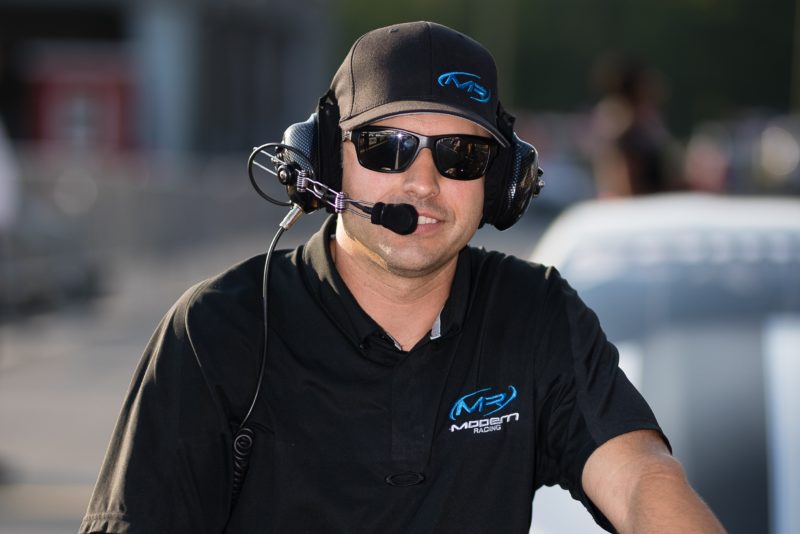
Justin Elkes (Rick Belden photo)
Elkes owns Modern Racing and has managed to tune just about everything when it comes to Pro Mod and Top Sportsman. He also continues to work in Pro Stock as well.
Brandon Stroud is a standout tuner with Proline Racing, which had been synonymous with turbochargers. But they’ve moved into the ProCharger world, with Stroud tuning John Camp and Jason Harris in PDRA Pro Boost. He’s also working on a roots-blown car with Steve Petty.
Stevie “Fast” Jackson is a world-champion driver across multiple classes, so it only makes sense he would do the same as a tuner. His expertise knows no bounds, and he’s successfully tuned nitrous and blown cars across Pro Mod, drag radial and other classes.
Rickie Jones is currently crew chief for Jeg Coughlin Jr.’s Pro Stock ride and does the same with Aaron Stanfield in the same class. But he’s raced in Pro Nitrous, and he’s tuned in a variety of classes, including Top Sportsman, Outlaw 632, Pro Nitrous and no prep.
When someone says you’re a versatile tuner, what does that mean to you?
SJ: It’s a huge, huge chip on my shoulder and it’s a big deal for me to not get backed into a box. My goal when I started was to tune anything wheels on it. I take satisfaction not just running them but tuning them to run them well. There’s not a lot I mess with that’s not the quickest in the world in some aspect. A lot of it was just being financially destroyed early and having to really work on stuff, as well as being surrounded by people who are like-minded. Billy [Stocklin] can work on anything and I’m sitting right next to him.
But standing behind a customer’s car and watching it perform like it should, it’s just as satisfying as sitting in the seat.
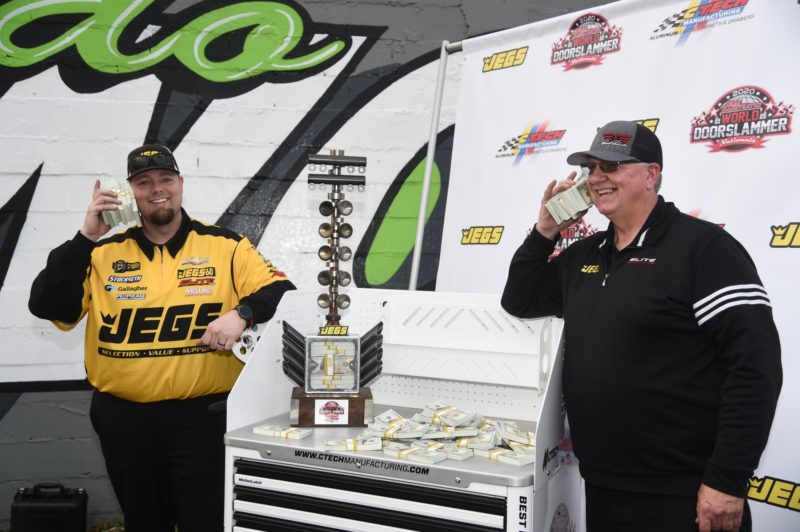
Rickie and Rick Jones (Chris Simmons photo)
RJ: What I like about it is every car is unique, every car’s power combination, the tracks that they race at. Every day is different and there’s an opportunity to learn every day, it doesn’t matter what car we’re working on. It is interesting to learn the differences between the different power adders and the cars and the chassis and the way that everything works. It’s never just one thing that’s like, “Here’s the magic button to push.” It’s always the whole package. So the engine’s got to be right, the converters got to be right. You have to find the happy spot as a package. So, it’s a challenge.
As a tuner, that’s what I find interesting about it. There’s always an opportunity to learn, always an opportunity to be better or go faster. Whatever it may be, it’s never stagnant. I think a lot of people on the outside might just see, “Oh hey, it’s a car. It goes in a straight line.” But there’s always something new, or always something different happening. Trying to learn to adapt and do the best with what we have is the fun part.
JE: It’s absolutely been big from a business standpoint. It’s taken on paths I didn’t expect to take on and that diversity helps. Until 2010, I had only worked on a Pro Stock car. That’s really all I knew to that point. The shop is very diverse now, from Top Sportsman racers to pro racers and we’re still heavily involved in Pro Stock. A guy can call the shop and need advice and because we tune all of them, we can speak pretty fluently on it because we have first-hand experience tuning it all.
How much pride do you take in being able to tune so many different things?
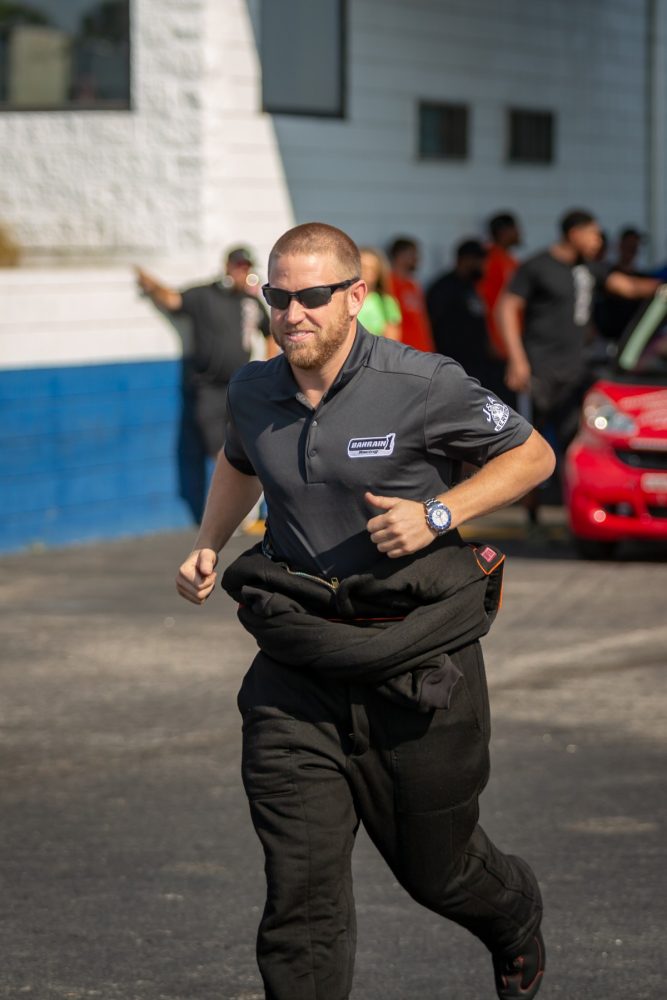
Stevie “Fast” Jackson (James Sisk photo)
SJ: The biggest thing is people get locked into a box of that’s how it’s always been done and how it works. I try not to get locked in that box. There’s always a better way to do everything. I don’t always think I do it the best way, but you have to think outside the box. A lot of people say they tune race cars, but all they do is pick up the phone and beg and ask for enough advice. If I have an idea, I go put it in a car and send it down the track. I’m not that smart, I’m just willing to go try things.
The way I run the car, you make it fast once the data is there and then you try to make it consistent. That’s the next step, not just going down the track, but doing it fast and consistently. If you do that, you’ll win a lot.
RJ: I’m just passionate about learning. The more I can learn, the more I can improve, the more I can help others. It doesn’t matter who you are, you’ve made a big investment to go out to the racetrack. I’ve been there and done it and struggled, and you chase your tail. It’s not fun when you’re struggling, so to be able to have someone that’s struggling and to come in and help them, and then see them go out and do well and see them be happy, there’s a lot of satisfaction in just helping people accomplish their goals.
The Pro Stock cars are probably the most refined as far as chassis goes. Those are the most sensitive to chassis stuff or suspension stuff. Pro Mod is a whole different story. You’ve got almost all the power in the world and you’re trying to get down the track, so it’s a whole different challenge. Then Top Sportsman, well, we’re just trying to be consistent. You don’t really care if we give up a hundredth in one area if it makes us go down the track 10 out of 10 times. Each car has its own challenges and goals, and there’s different ways to skin it and get it done.
Then behind the scenes you’ve got nitrous, you’ve got EFI, you’ve got turbos and ProChargers and screw blowers, and all the different power adders, and you’ve got some guys running 10.5s or radials. They’re running on a different track prep, or no prep, and it’s always different. So it never gets boring to me. It’s always interesting.
BS: To me, the more knowledge the better, no matter the type of car. The racing circle is small and there’s a lot of smart people. To keep up with them and beat them, you have to gain as much knowledge and experience as you can. The more runs you make with different things, the more you learn and the more you can get ahead.
I think it’s kind of exciting to have a lot more of a mix, and now you have ProCharger mixed in. There’s a mix of things and at different races there’s different advantages based on the time of year. It’s kind of exciting to be in it and see it ever-evolving.

Jason Harris’ Brandon Stroud-tuned ProCharger Camaro (Roger Richards photo)
Where did that passion to learn come from? Are there lessons to be learned from the approach you’ve taken?
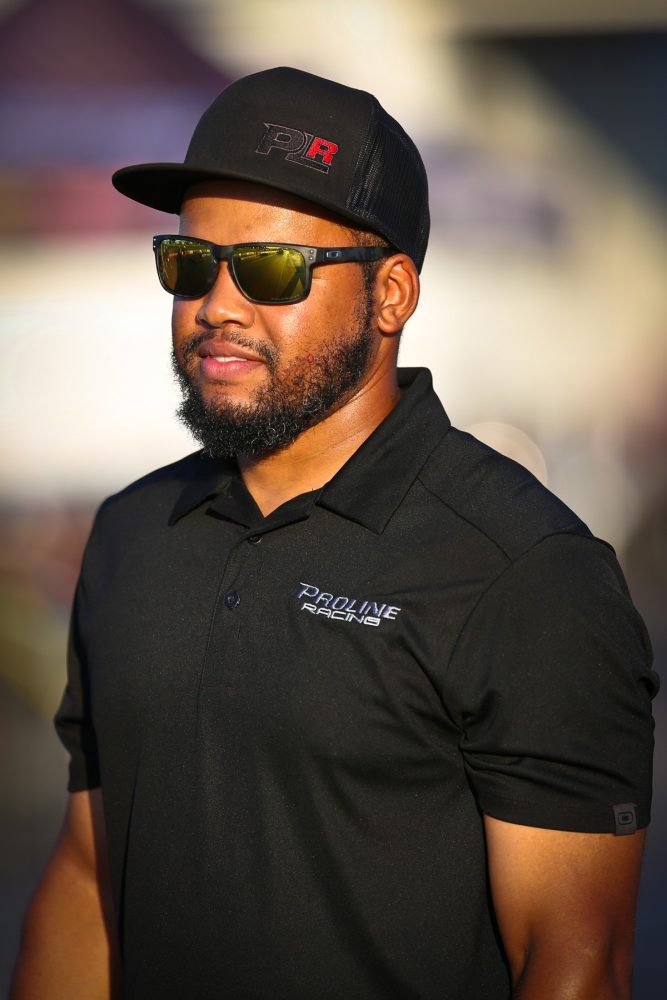
Brandon Stroud
BS: For me, it just started from being a crew guy, working on cars with different power adders and figuring out how they do what they do. Once I got an understanding for it, it was easier for me to pick up tuning it. At Proline, I’ve done a lot of different things. I started working on a turbo car, and now we have our hands in everything. Especially in these times, I’m not trying to limit what I can work on.
I’m lucky enough to work for a lot of smart people who have shown me and helped me grow. That’s a lot of what drag racing is: a lot of really smart, great people in the sport who are willing to kind of bring you in. I’ve been lucky enough to be under a lot of smart crew chiefs that have been successful. A lot of it is approach and mindset, understanding the track and what you’re trying to accomplish, understanding of how they got to that point and knowing the background of it. People teaching me the why and how, that went a long way.
SJ: I love tuning cars as much as I love driving. When I was a kid, I thought a drag racer did everything. I molded everything after people I watched like Todd Tutterow and Scotty Cannon, guys that did everything. I never knew there could be another way. I thought you had to do everything. Nobody can take away the knowledge you get when you do it all.
JE: I jumped at the chance to work with Frank Manzo. To learn from someone like that was awesome, and the turbo deal was just something technologically advanced and I’m a huge technology person. I like pushing the envelope and felt the turbo package did that. I was always jealous of the guys who got to tune that because of all the opportunities they had.
When you’re working with multiple power adders or cars in different classes, how do you balance that, especially if all of that is coming during one race weekend?
SJ: You have to compartmentalize your brain, almost like you’re closing doors and opening doors in your brain. Once you’re done with that box you close it, forget that box and open up a new one. The only way I describe it is you carve that 100 percent of your brain however you can, focus on the one you’re working on 100 percent and not think about the rest of them.
JE: If you look back, I really try to focus on one per season. Last year, it was the turbos and I just kind of started playing around with ProCharger. Years prior, I was doing a lot of nitrous stuff. That’s kind of been my path. For me to really be involved with a program, you really have to be dedicated to things as a tuner. The days of showing up and suggesting a few things are getting slim because the competition is so great and the tuners are all great at what they do.
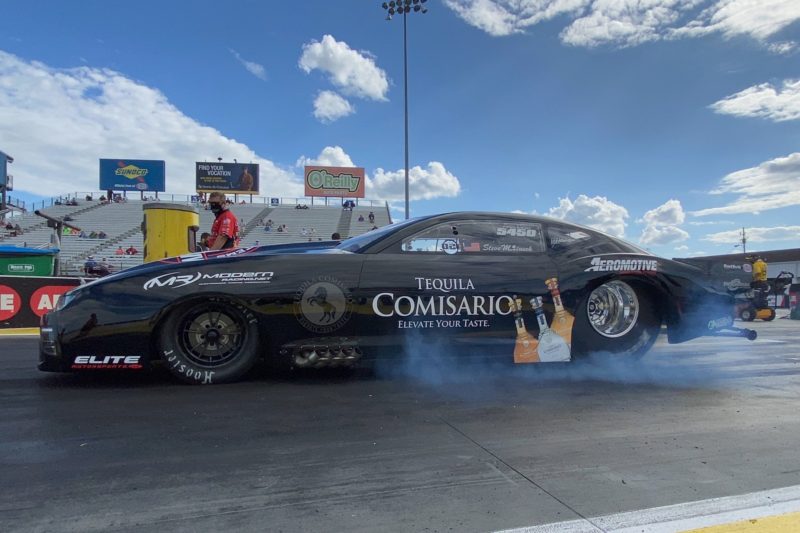
These types of cars are so different, especially factoring in tires, power adders and everything. How much crossover can you get from one power adder to another, and is it exciting when you can take something from one power adder and apply it successfully to another?
RJ: It is cool to see that crossover. There is a lot of things we’ve learned from our Pro Stock cars and it works somewhere else. I might learn through trial and error, and hey, we just hit on something with this car we’re working on in Brazil and it’s cool how some of it is all connected. At the end of the day, I approach each car as, “Hey, it’s steel and rubber.” The chassis is made of steel and the tires are made of rubber.
Yeah, there is this power adder or whatever’s driving this thing, but still the goal is to use as much of that power as possible, and get it to the racetrack and accelerate the car. So a lot of the basics are the same and you might hit on something that does cross over, but a lot of times too, I find things that don’t, and that’s what makes it so interesting. I’ll often go back maybe, let’s say, six or seven years ago to something I tried or we had done. Maybe that didn’t work back then with these other five things, but guess what? These other five variables have now changed, so let’s try this setup or component with the new variables we have.
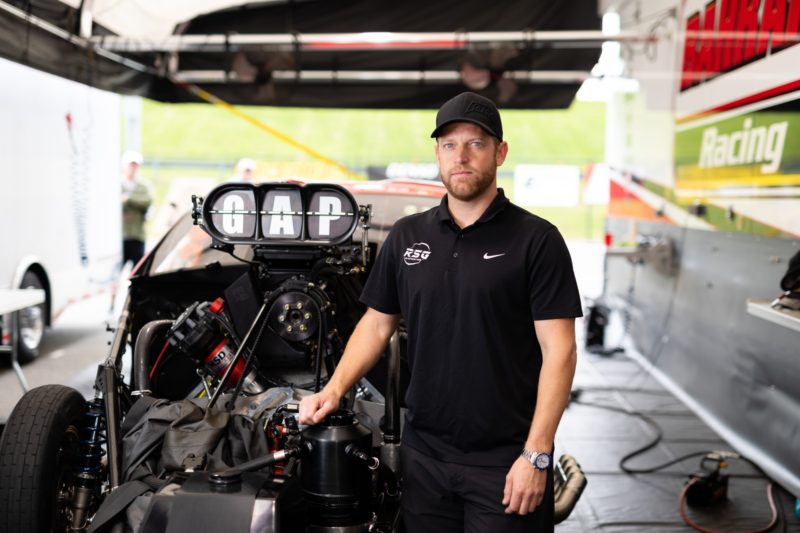
SJ: We recently learned something on a small-block nitrous car that’s going to make the “Shadow” faster. It’s about being able to spot a diamond in the rough, knowing how to put a different cut on it and not chasing the rabbit too far down the hole. You will always see some glimmer of hope, but you have to know when to chase it and know when to stop.
BS: These days, competition is so tough to really stay ahead, you almost can’t be locked into one thing. To be up front, it’s beneficial to get your feet wet in a lot of cars, different classes, different power adders. The more time at the track, the better you’ll be. You can’t really get ahead if you’re at home. No two cars are the same, but you can still kind of apply something to each as well.
JE: I’ve tuned a turbo, saw some trends and this result and I’ll say let’s try this with a nitrous car. Working with different combos makes you think outside the box and that’s what it’s about. That’s a big part of why I got out of Pro Stock. From the chassis side, there’s not a lot of stuff going on and it kind of became monotonous. In Pro Mod, there’s so much low-hanging fruit, especially a few years ago. The class has made some huge advancements.
You can take some of these tuning trends in Pro Mod to Top Sportsman to help someone, and I really think you’ll start seeing some of these Pro Stock crew chiefs cross over to Pro Mod as well.
